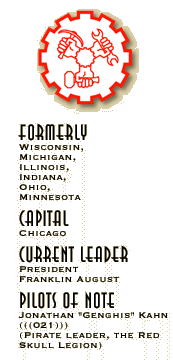
 |
||
 |
The manufacturing giant of the continent, the Industrial States of America has more industrial capacity than its two closest competitors combined. The I.S.A. produces airplanes, zeppelins, automobiles, engines, weapons, appliances, tools, and virtually anything else that can be fabricated. It is also blessed with a large and varied agricultural base, producing enough food to feed its own citizens and export surplus to foreign markets. It retains an impressive internal road and rail network, serving the logistical needs of the six Industrial States well. The only thing the ISA really lacks is access to markets: the ISA is surrounded by rivals and enemies, none of whom make it easy to get to market. All waterborne shipping into and out of the Great Lakes region is either subject to heavy tariff or refused passage by the Empire State. Ontario's neutrality allows a small loophole, though the ISA finds Ontario's handling fees only marginally more acceptable. Quebec's tariffs are just as bad as Ontario's and the other Canadian alternatives. French Louisiana is more affordable, but shipping down the Mississippi requires small but additive handling fees for Arkansas, Missouri, and Mississippi, and from Appalachia. The ISA can hardly complain; the Confederation of Dixie states make up a large percentage of the ISA's continental market. Zeppelin air cargo is cheaper per shipment, but air freight continues to be expensive in bulk, and is subject to air piracy. The ISA is nominally governed by a President and a Representative House. The ISA President, Franklin August, has only modest power and acts more as a figurehead. He defers to the wishes of a shadowy council of businessmen and financiers who provide the nation’s financial and military backing. The Empire State is the ISA's main rival, although the People's Collective remains the factory lords' greatest nightmare. This sprawling socialist nation runs the western length of the ISA. Although mainly agricultural, the Collective does have the industrial capacity to supply its own military and domestic needs, and threatens to raise the ire of the factory workers, possibly rousing the now-broken unions once again into action. |
|
 |